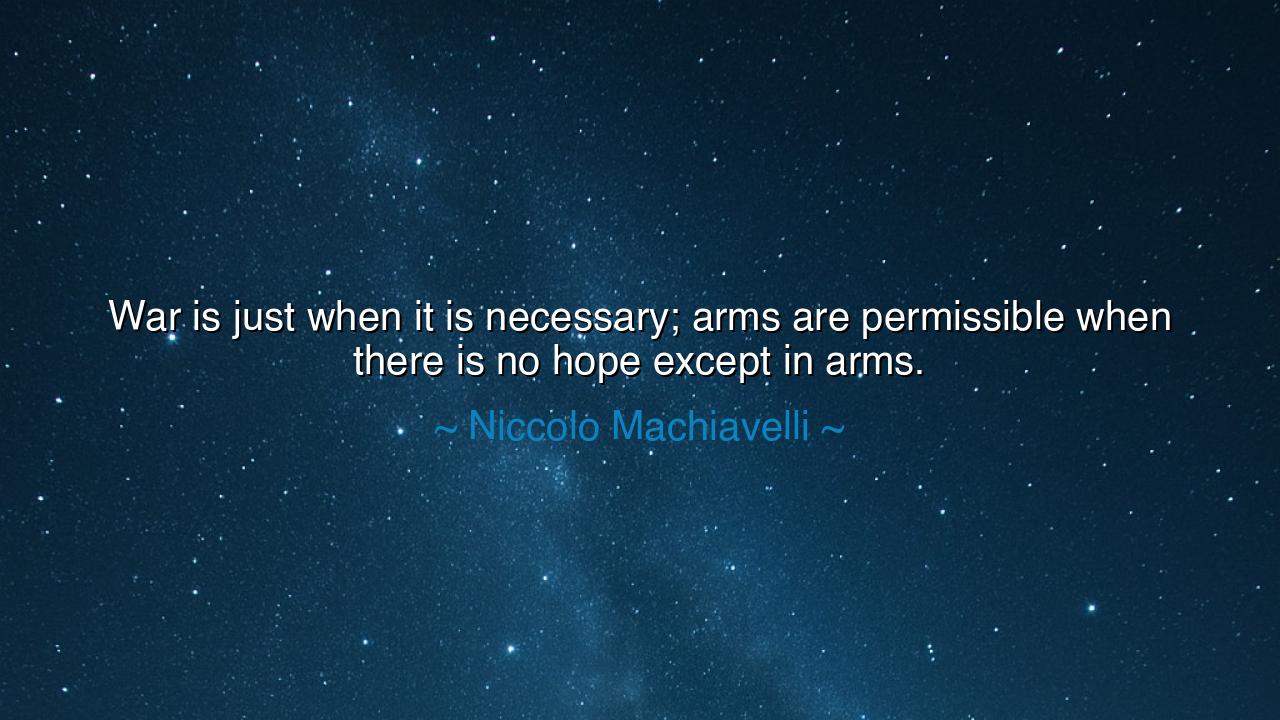
War is just when it is necessary; arms are permissible when there
War is just when it is necessary; arms are permissible when there is no hope except in arms.






“War is just when it is necessary; arms are permissible when there is no hope except in arms.” Thus wrote Niccolò Machiavelli, the Florentine philosopher whose words cut through illusion like a sword through fog. In this brief yet thunderous declaration, he reveals the cold logic and tragic wisdom of necessity—the truth that war, that most dreadful of human inventions, may at times be not an act of greed or glory, but of survival. For Machiavelli, the morality of war is not found in the purity of motive, but in the urgency of need. When every path of peace is closed, when hope itself has fled except in resistance, then and only then is war just.
Machiavelli lived in a time when Italy was torn by endless strife—city against city, kingdom against kingdom, each devouring the other in pursuit of power. He watched as foreign armies marched across his homeland, as peace treaties dissolved into betrayal, and as statesmen cloaked ambition in the language of virtue. In that furnace of chaos, he forged his philosophy of realism. He saw that to survive in such a world, one must first see it clearly—not as it ought to be, but as it is. Thus his words are not a celebration of war, but an acknowledgment of the hard truth: that necessity can sanctify even the sword.
In this sense, Machiavelli stands apart from dreamers and idealists. He does not glorify violence; he laments its inevitability. For him, the true measure of justice in war lies not in rhetoric, but in circumstance. To take up arms for conquest or vanity is corruption; to take up arms because life itself is threatened—that is duty. This distinction echoes through the ages, for every generation must face the question: when is it right to fight? And Machiavelli’s answer remains unflinching—only when all else has failed, when arms become the final sanctuary of the desperate and the oppressed.
History offers many witnesses to this truth. Consider Winston Churchill, who, in the dark year of 1940, refused to surrender his nation to tyranny. Surrounded by enemies, isolated, and weary from battle, he declared that Britain would “fight on the beaches,” for he understood what Machiavelli had long before written—that when there is no hope except in arms, to lay them down is to invite annihilation. War, in that hour, was not cruelty but courage. Peace, if purchased with submission, would have been a lie. So the nation stood, and in that necessity found its justice.
Yet there is another layer to Machiavelli’s words, one that reaches beyond politics into the heart of human life. Each soul, at some point, must face its own war—a moment when it stands against forces that would crush it. Sometimes these enemies are not armies, but fear, despair, or injustice. In such moments, the spirit too must take up arms, not of steel but of will. There are times when gentleness will not suffice, when peace within is found only through struggle. Then, as in the affairs of nations, the fight becomes sacred, for it is waged in defense of dignity and survival.
Still, Machiavelli’s wisdom is edged with warning. He reminds us that war, even when just, is always terrible, and that the wise ruler seeks peace until peace becomes a weapon in the hands of the wicked. One must exhaust all paths of diplomacy, patience, and prudence before reaching for the sword. But when that moment comes—when injustice chokes the breath of freedom, when the oppressor demands silence, when submission means the death of the soul—then arms are no longer a choice, but a moral command. For to refuse the fight when life itself is threatened is to betray life’s sacredness.
So, my child of tomorrow, take this lesson to heart: seek peace first, for peace is the mother of prosperity and the foundation of joy. But if peace demands the surrender of truth, if it asks you to kneel before cruelty or abandon those who cannot defend themselves, then rise. Let your hand be steady and your purpose pure. Remember that the sword of necessity must never be drawn in arrogance, nor raised in vengeance, but wielded with the gravity of one who knows its cost.
For Machiavelli’s teaching is not that war is good, but that there are moments when inaction is worse—when to fight is the last expression of hope, the final cry of the living against the forces of oblivion. Thus, when you face the storms of your own time, remember these ancient words: “War is just when it is necessary; arms are permissible when there is no hope except in arms.” Let them remind you that courage, tempered by wisdom and guided by necessity, is not cruelty—but the final defense of what is right, when all else has been lost.






AAdministratorAdministrator
Welcome, honored guests. Please leave a comment, we will respond soon